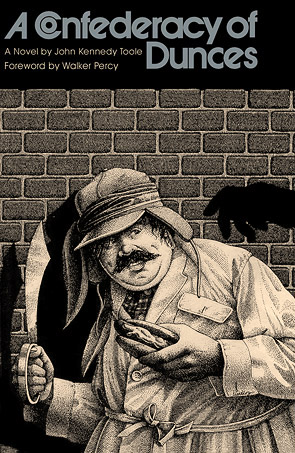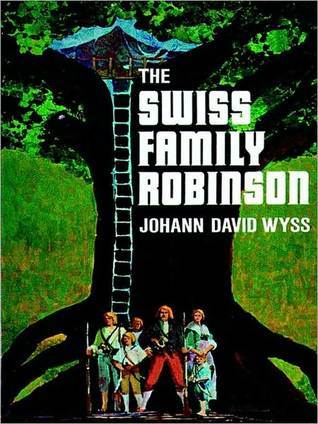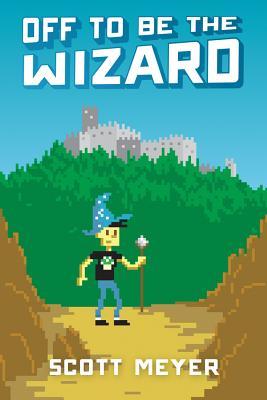Reading Bucket List: A Confederacy of Dunces
Aug 31, 2017Reading Bucket List is an ongoing series in which I read a classic book and share my notes and thoughts about it. This is the second post in the series
 This book is considered a modern classic by many and, although highly entertaining, I found it difficult to deduce exactly what the author was trying to tell us beyond “here’s how not to live your life” The book’s protagonist, one Ignatious J. Reilly is a rotund individual of questionable sanity and even more questionable morals. He spends the majority of his misadventures blaming his plight on the mythical Fortuna, his mother, some “mongoloid’ or another, or even his misbehaving pyloric valve. Ignatious is the model of fecklessness. Constantly pointing blame at anyone or anything but himself.
This book is considered a modern classic by many and, although highly entertaining, I found it difficult to deduce exactly what the author was trying to tell us beyond “here’s how not to live your life” The book’s protagonist, one Ignatious J. Reilly is a rotund individual of questionable sanity and even more questionable morals. He spends the majority of his misadventures blaming his plight on the mythical Fortuna, his mother, some “mongoloid’ or another, or even his misbehaving pyloric valve. Ignatious is the model of fecklessness. Constantly pointing blame at anyone or anything but himself.
Much of the story centers around Ignatious attempting to hold down a steady job to help his mother pay back a small debt she owes. The absurdity that ensues is no doubt some of the more ridiculous and creative (mis)adventure ever put down on paper. It is a cautionary tale about what happens when a person has an unyielding world-view, has no regard for how his actions impact the people around him, is willing lie to protect himself, and refuses to take responsibility for his own actions. In many ways he is the worst manifestation of a human being that you can possibly think of. That being said, I think everyone will probably be able to find a little bit of themselves somewhere in Ignatious. And once you see it you’ll almost certainly be motivated to make some changes so as not find Ignatious so relatable.
One interesting fact about the book that I didn’t pick up on initially is that it’s really all about money. Ignatious needs to work because his mother owes money. Jones needs a job because he doesn’t want to be picked up for vagrancy but is constantly complaining about only making $20 an hour. Ignatious is always trying to squeeze an extra dollar here and there to pay for his movie habit. Mr. and Mrs. Levy are sued for $500,000 due to Ignatious’s actions. Really, the only part of the book that isn’t about money is the ill-fated attempt to create a political party.
Overall I found the book extremely readable, amusing, entertaining and insightful in many ways. It is, without question, one of the most creative and unique books I’ve ever read and it’s because of this that I would recommend it to anyone in a heartbeat.
Permalink
Reading Bucket List: The Swiss Family Robinson
Aug 7, 2017Reading Bucket List is an ongoing series in which I read a classic book and share my notes and thoughts about it. This is the first post in the series
 The Swiss Family Robinson, published in 1812 by Swiss novelist Johann David Wyss tells the story of a family (of Swiss origin no less) stranded on an island somewhere in the East Indies after their ship was wrecked. The story was written as an instructional guide on “family values, good husbandry, the uses of the natural world and self-reliance.” 1 The author’s goal becomes self-evident early in the story when, soon after arriving on the island of New Switzerland the father, William, spends little or no time securing the family’s rescue. Instead, the family dives head-first into working toward a permanent settlement on the island. It’s clear that the author used the shipwreck as a means to get the family together in one place without outside influence so that the lessons could begin in earnest.
The Swiss Family Robinson, published in 1812 by Swiss novelist Johann David Wyss tells the story of a family (of Swiss origin no less) stranded on an island somewhere in the East Indies after their ship was wrecked. The story was written as an instructional guide on “family values, good husbandry, the uses of the natural world and self-reliance.” 1 The author’s goal becomes self-evident early in the story when, soon after arriving on the island of New Switzerland the father, William, spends little or no time securing the family’s rescue. Instead, the family dives head-first into working toward a permanent settlement on the island. It’s clear that the author used the shipwreck as a means to get the family together in one place without outside influence so that the lessons could begin in earnest.
The story spins out as a series of lessons masquerading as adventures that teach all kinds of things from how get sugar out of a fictional sugarcane plant, to creating shoes, to training all sorts of animals. Although the individual lessons are mostly useless in the modern world (and probably even if you were stranded on a deserted island), the major underlying points regarding the evils of idleness, cooperation, and self-sufficiency are always in the background making themselves known. In fact, Wyss cleanly summarizes his own story with an excellent statement near the very end of the book:
Children are, on the whole, very much alike everywhere, and you four lads fairly represent multitudes, who are growing up in all directions. It will make me happy to think that my simple narrative may lead some of these to observe how blessed are the results of patient continuance in well-doing, what benefits arise from the thoughtful application of knowledge and science, and how good and pleasant a thing it is when brethren dwell together in unity, under the eye of parental love.
As an aside, one aspect of the story I felt was rather odd was the way in which the family treats the wildlife on the island. Certainly the animals they domesticated for use as beasts of burden makes perfect sense given the resources available to them not to mention the state of technology in the early 1800s. That being said, there were a number of occasions where mischievous animals (mostly monkeys) were subjected to capital punishment for simple acts of trespassing. All manners of methods were used for the execution from shooting, to traps, to poison with only the slightest hint of regret. It was, of course, a very different world 200 years ago when the book was published but I have to wonder if this was the prevailing mentality on the treatment of animals at the time then it’s no wonder humans did so much damage to the natural ecosystem in those times.
Although The Swiss Family Robinson is clearly a book aimed at children of the day, the dedication the family shows to each other and their resourcefulness is nothing to be ignored and can be rather inspirational at times. Certainly the lessons that Wyss is trying to teach have value no matter the century. As a father of 3 myself, I would love to see my kids working harder towards their goals, and enjoying the satisfaction of being self-sufficient. If nothing else, reading this book has encouraged me to try to work harder to instill these values into my own children so that they may reap the rewards of a life well-lived.
1 quote taken from Wikipedia article
Permalink
Book Review: Off To Be The Wizard
Jan 8, 2016 In Off To Be The Wizard author Scott Meyer tells the story of Martin, a regular guy living a regular life who discovers a hidden file on the Internet that controls the entire world. A simple edit to the file can teleport Martin to new locations, send him back in time, or even fill his bank account. This last one gets Martin in a little bit of hot water with the authorities so he decides that the obvious solution is to go back to medieval England and become a wizard. Little does Martin know that not only is he not the first person to find this file but he’s also not the only one to think it might be a good idea to go back in time in order to use the files powers to be the next Merlin. Martin soon meets a wide variety of colorful characters who ultimately need to team up to defeat a Rouge wizard who is using the file to violate the natural order of things.
In Off To Be The Wizard author Scott Meyer tells the story of Martin, a regular guy living a regular life who discovers a hidden file on the Internet that controls the entire world. A simple edit to the file can teleport Martin to new locations, send him back in time, or even fill his bank account. This last one gets Martin in a little bit of hot water with the authorities so he decides that the obvious solution is to go back to medieval England and become a wizard. Little does Martin know that not only is he not the first person to find this file but he’s also not the only one to think it might be a good idea to go back in time in order to use the files powers to be the next Merlin. Martin soon meets a wide variety of colorful characters who ultimately need to team up to defeat a Rouge wizard who is using the file to violate the natural order of things.
Despite the very far-fetched plot line, I found Off To Be The Wizard to be a very entertaining read. The story is fast paced with just enough action and humor to keep you turning pages. The humor in the book leans heavily on geek culture and the book is clearly geared towards readers who are self-described “geeks.” Meyer uses a lot of computer vernacular when describing how the wizards interact with the file that may be a turn-off to anyone who isn’t very computer literate.
On the character front, Off To Be The Wizard is really dominated by the the wizards themselves and their interactions with each other. There is really only one or two scenes in which the wizards have any lengthy interaction with the common folk of medieval England. This doesn’t really pose a problem since much of the story revolves around Martin coming to grips with his new found power and the community of wizards he is trying to become a part of. I’m interested to see if Meyer takes the story in a different direction in the second book of the series.
Off To Be The Wizard is not without its flaws. As I mentioned before, the plot line is very far-fetched. There is only a brief discussion of the implications of time-travel. The changes that the characters make in the past have no effect on their future. However, they really don’t get into how the changes will impact some other future. Meyer is hoping you don’t spend too much time thinking about the paradoxes that his world produces. There is also the matter of how all these wizards end up going back to the exact same time in history. This is discussed briefly but seems like another area where the author is just hoping you suspend your disbelief.
In conclusion, if you are a self-described geek who enjoys computers, time travel paradoxes, and fantasy then I think you’re going to enjoy the first novel in Scott Meyer’s Wizard 2.0 series. If you find any of these things boring you may want to stay away.
3.5/5 stars
Buy Off To Be The Wizard from Amazon
Permalink